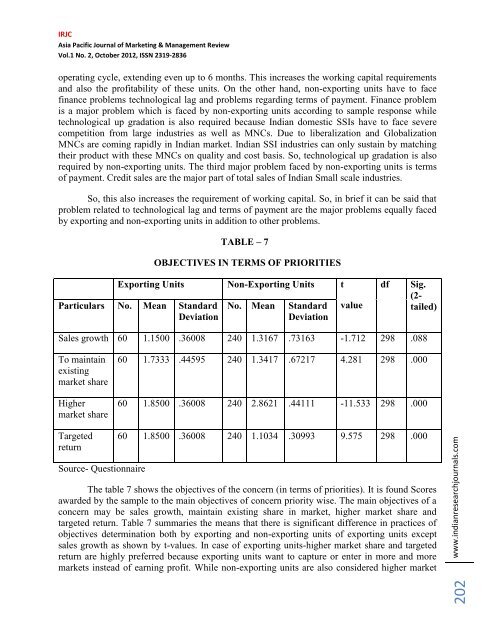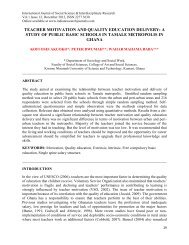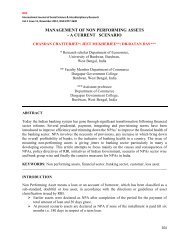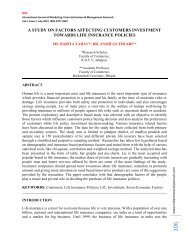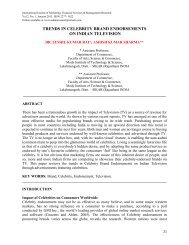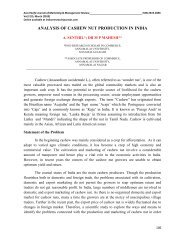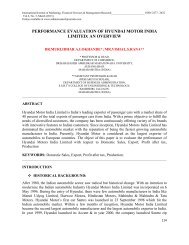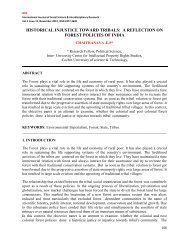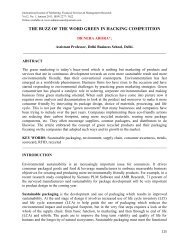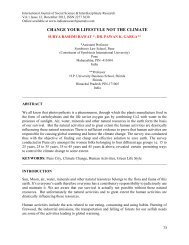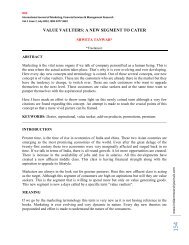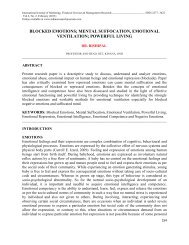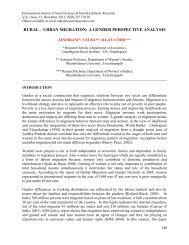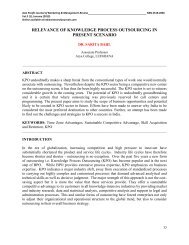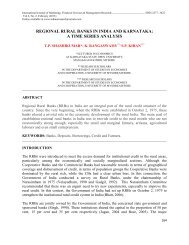problems and prospects of small scale industrial units
problems and prospects of small scale industrial units
problems and prospects of small scale industrial units
You also want an ePaper? Increase the reach of your titles
YUMPU automatically turns print PDFs into web optimized ePapers that Google loves.
IRJC<br />
Asia Pacific Journal <strong>of</strong> Marketing & Management Review<br />
Vol.1 No. 2, October 2012, ISSN 2319-2836<br />
operating cycle, extending even up to 6 months. This increases the working capital requirements<br />
<strong>and</strong> also the pr<strong>of</strong>itability <strong>of</strong> these <strong>units</strong>. On the other h<strong>and</strong>, non-exporting <strong>units</strong> have to face<br />
finance <strong>problems</strong> technological lag <strong>and</strong> <strong>problems</strong> regarding terms <strong>of</strong> payment. Finance problem<br />
is a major problem which is faced by non-exporting <strong>units</strong> according to sample response while<br />
technological up gradation is also required because Indian domestic SSIs have to face severe<br />
competition from large industries as well as MNCs. Due to liberalization <strong>and</strong> Globalization<br />
MNCs are coming rapidly in Indian market. Indian SSI industries can only sustain by matching<br />
their product with these MNCs on quality <strong>and</strong> cost basis. So, technological up gradation is also<br />
required by non-exporting <strong>units</strong>. The third major problem faced by non-exporting <strong>units</strong> is terms<br />
<strong>of</strong> payment. Credit sales are the major part <strong>of</strong> total sales <strong>of</strong> Indian Small <strong>scale</strong> industries.<br />
So, this also increases the requirement <strong>of</strong> working capital. So, in brief it can be said that<br />
problem related to technological lag <strong>and</strong> terms <strong>of</strong> payment are the major <strong>problems</strong> equally faced<br />
by exporting <strong>and</strong> non-exporting <strong>units</strong> in addition to other <strong>problems</strong>.<br />
TABLE – 7<br />
OBJECTIVES IN TERMS OF PRIORITIES<br />
Exporting Units Non-Exporting Units t<br />
Particulars No. Mean St<strong>and</strong>ard<br />
Deviation<br />
No. Mean St<strong>and</strong>ard<br />
Deviation<br />
value<br />
df Sig.<br />
(2tailed)<br />
Sales growth 60 1.1500 .36008 240 1.3167 .73163 -1.712 298 .088<br />
To maintain<br />
existing<br />
market share<br />
Higher<br />
market share<br />
Targeted<br />
return<br />
Source- Questionnaire<br />
60 1.7333 .44595 240 1.3417 .67217 4.281 298 .000<br />
60 1.8500 .36008 240 2.8621 .44111 -11.533 298 .000<br />
60 1.8500 .36008 240 1.1034 .30993 9.575 298 .000<br />
The table 7 shows the objectives <strong>of</strong> the concern (in terms <strong>of</strong> priorities). It is found Scores<br />
awarded by the sample to the main objectives <strong>of</strong> concern priority wise. The main objectives <strong>of</strong> a<br />
concern may be sales growth, maintain existing share in market, higher market share <strong>and</strong><br />
targeted return. Table 7 summaries the means that there is significant difference in practices <strong>of</strong><br />
objectives determination both by exporting <strong>and</strong> non-exporting <strong>units</strong> <strong>of</strong> exporting <strong>units</strong> except<br />
sales growth as shown by t-values. In case <strong>of</strong> exporting <strong>units</strong>-higher market share <strong>and</strong> targeted<br />
return are highly preferred because exporting <strong>units</strong> want to capture or enter in more <strong>and</strong> more<br />
markets instead <strong>of</strong> earning pr<strong>of</strong>it. While non-exporting <strong>units</strong> are also considered higher market<br />
202<br />
www.indianresearchjournals.com


